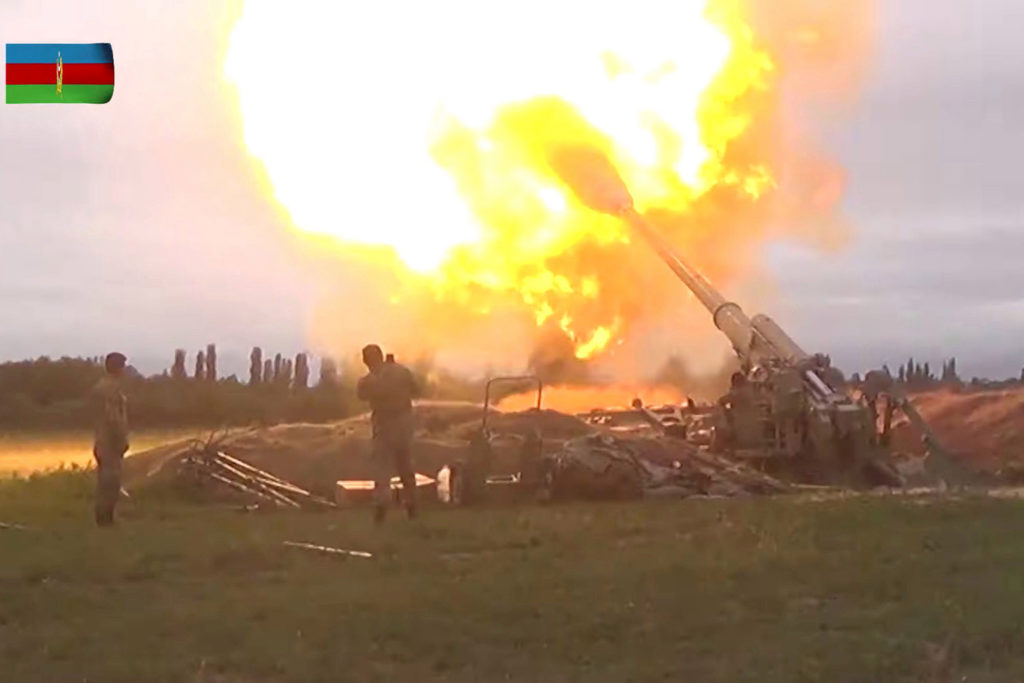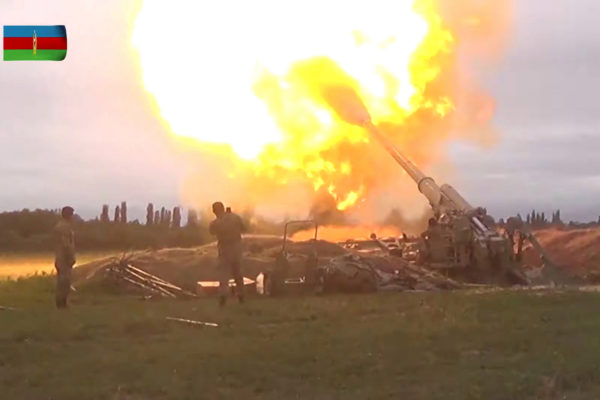YEREVAN/BAKU (Reuters) – Artillery strikes on civilians in the Nagorno-Karabakh conflict could amount to war crimes, the U.N. human rights chief said on Monday, reiterating a call for Azerbaijan and Armenia to halt attacks on towns, schools and hospitals in the mountain enclave.

Separately, Armenia’s prime minister called for an investigation into the presence of “foreign mercenaries” in Nagorno-Karabakh after ethnic Armenian forces said they had captured two fighters from Syria.
Azerbaijan denied the presence of foreign combatants.
Fierce battles continued along the front line of a conflict that has killed at least 1,000 people, and possibly many more. Nagorno-Karabakh is internationally recognised as part of Azerbaijan but is populated and controlled by ethnic Armenians.
U.N. High Commissioner for Human Rights Michelle Bachelet said indiscriminate attacks in populated areas in and around the conflict zone contravened international humanitarian law.
She said in a statement that repeated calls for both Armenia and Azerbaijan to avoid the loss of civilian life and damage to civilian infrastructure had gone unheeded.
“Instead, homes have been destroyed, streets reduced to rubble, and people forced to flee or seek safety in basements,” she said. “Such attacks must stop and those responsible for carrying them out, or ordering them, must be held to account.”
Just hours after agreeing in Geneva on Friday to avoid the deliberate targeting of civilians, Azerbaijan and ethnic Armenian forces in Nagorno-Karabakh accused each other once more of shelling residential areas.
Citing data from both sides of the conflict, Bachelet said about 40,000 Azeris had been temporarily displaced by the latest fighting while some 90,000 ethnic Armenians had fled Nagorno-Karabakh and were currently in Armenia.
International rights groups have also accused both sides of using banned cluster munitions, most recently in the shelling of the Azeri city of Barda on Wednesday.
Foreign fighters
Armenia’s foreign ministry said the Artsakh Defence Army, its name for the ethnic Armenian forces in Nagorno-Karabakh, had captured two Syrian combatants over the weekend, one from Idlib province and the other from Hama.
Armenian Prime Minister Nikol Pashinyan said in a Facebook post that the involvement of “foreign mercenaries” was “a threat not only to the security of Nagorno-Karabakh and Armenia but also to international security and this issue should become a subject of international investigation.”
Asked about foreign fighters, Azeri presidential aide Hikmet Hajiyev said: “We reject such allegations.”
The Nagorno-Karabakh defence ministry said fierce battles took place along parts of the front line on Monday and that it had repelled an Azeri platoon. A spokesman for the ministry said a deputy commander in the Artsakh army was killed in combat.
Armenian defence ministry spokeswoman Shushan Stepanyan said artillery fire killed one civilian and wounded two in the country’s southern Syunik region.
Azerbaijan’s defence ministry said it had repelled an attack on its positions in the high ground of the Zangilan district, between the enclave and the Iranian border, while army units in the Gazakh, Tovuz and Dashkesan regions also came under fire.
Azeri President Ilham Aliyev wrote on Twitter that Azerbaijan had retaken a further eight settlements in Zangilan, Gubadli and Jabrayil regions.
Genocidal path
Armenian Prime Minister Nikol Pashinyan accused Turkey of “once again advancing on a genocidal path” .
Pashinyan said last week that Turkey had sent thousands of Syrian mercenaries to the region and Turkish military officers were directly involved in leading the Azeri offensive.
“The world must be aware of what is going on here,” he said.
“Turkey’s wish is to strengthen its role and influence in the South Caucasus. It’s pursuing the dream of building an empire imitating the Sultanate and it is embarking on a path that could set the region ablaze.”
“The situation is much more serious (than previous clashes in 2016). It would be more appropriate to compare it with what happened in 1915, when more than 1.5 million Armenians were slaughtered during the first genocide of the 20th century,” Pashinyan told Le Figaro newspaper in an interview published last week
REUTERS/ YL


Leave a Reply
You must be logged in to post a comment.